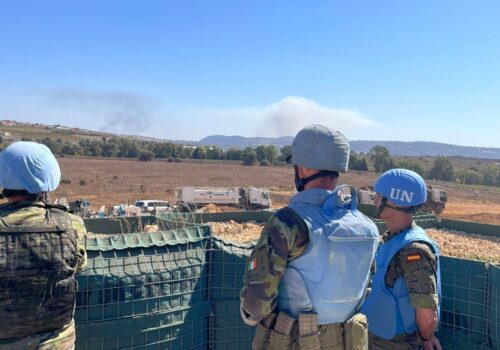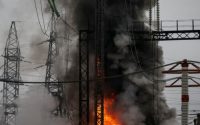Gaza is a war without end. American interests must be reassessed.
From the very beginning of the armed conflict ignited by the Hamas atrocities of October 7, 2023, US officials have counseled their Israeli counterparts to identify achievable political objectives and embed them in whatever military operations might ensue. “Don’t make the mistakes we made in Vietnam, Iraq, and Afghanistan,” warned the Americans. “Understand that in modern, post-World War II warfare, civilians are not the enemy; capturing their will is the objective, and the body count of enemy soldiers is incidental. You absolutely must define a politically sustainable endgame before you begin shooting.” Israel’s military professionals understood the message. However, neither they nor their political masters saw it as relevant to the challenge they faced and still don’t. Why is that, and what are the implications for American foreign policy? What, if anything, can Washington do?
The killing of Hamas leader Yahya Sinwar on October 16 adds exclamation points to the questions posed above. US officials hope fervently that Sinwar’s passing could be an inflection point, one in which Israel uses his death to its diplomatic advantage by securing the release of Israeli hostages via a Gaza ceasefire agreement. But why would Israel do so? Having fought for over a year without a political end-state objective, what would be the point now of shifting from warfare to diplomacy?
SIGN UP FOR THIS WEEK IN THE MIDEAST NEWSLETTER
Based on what has been seen over a year, Israel seems to believe that waging war in Gaza in accordance with post-World War II lessons learned in battling insurgents and terrorists is impossible. No, it has not adopted the Blitz of London or the firebombing of Tokyo as its methodology. Yet, if the support of civilians is the post-World War II warfare objective, Israel seems to regard that objective as mission impossible.
Recall that Israeli President Isaac Herzog stated soon after October 7, 2023, “The entire [Palestinian] nation is responsible. This rhetoric of ‘unaware, uninvolved civilians’ is not true. They could’ve resisted, they could’ve fought this evil regime that took over Gaza.”
Separately, Israeli Defense Minister Yoav Gallant said on October 9, 2023, “I have ordered a complete siege on the Gaza Strip. There will be no electricity, no food, no fuel, everything is closed. We are fighting human animals and we act accordingly.”
These were not the sentiments of officials hoping to persuade two million Palestinian civilians not to support the terrorists and criminals ruling them. Instead, they seemed to reflect the view that Palestinians want Jews currently residing between the Mediterranean Sea and the Jordan River gone, dead, or some combination thereof. Post-October 7, this view may well reflect the majority Israeli opinion, and it is a view closely analogous to how Palestinians interpret the intentions of Israelis.
Yes, there have been periodic reports about Defense Minister Gallant and senior Israel Defense Forces (IDF) commanders decrying Prime Minister Benjamin Netanyahu’s inability or unwillingness to set achievable political objectives for military operations. However, these IDF reservations seem to have more to do with force preservation (the prospect of endlessly throwing limited resources at open-ended problems) than with tying military strategy to achievable political objectives, particularly if those objectives envision eventual Palestinian self-rule.
Indeed, there is no evidence at all that the IDF sees capturing the will of Palestinian or Lebanese civilians as desirable or even possible. On the contrary, the IDF has applied the international legal standard of “proportionality,” considering the impact on civilians when engaging a military target) in Gaza and Lebanon in ways it would never dream of doing, targeting terrorists embedded in Jewish urban neighborhoods. The IDF, like its civilian masters, seems to view capturing the will of Palestinian civilians as a lost cause.
The official Israeli view that what happened on October 7 is just the latest episode of a zero-sum war between two enemy peoples makes it clear why Israel has played judo with American advice for over a year. It has signaled understanding of what’s been recommended, rendered thanks for ongoing US support, and often done things contrary to that which has been counseled. To Israeli leaders, the American official view of a reformed Palestinian Authority (PA) replacing Hamas in Gaza and preparing the way for a two-state outcome seems naïve.
Is Israel’s assessment of what it faces—irreversible Palestinian hostility—correct? It may, at the very least, prove to be catastrophically self-fulfilling. Yet, it appears to be a view sincerely held by many Israelis. It is certainly the view animating the actions of Israel’s government and military. Some argue that Israeli Prime Minister Netanyahu wants extended warfare mainly for reasons of personal political survival. Yet those Israelis who oppose him—particularly those desiring the release of Hamas-held hostages as the top priority—seem to have limited political purchase in today’s Israel.
Critics of Israel’s refusal to define a sustainable endgame in Gaza, one holding out the possibility of non-Hamas Palestinian self-determination, argue that the stage is merely being set for future armed conflicts, for wars without end, interrupted only by periods of tense quiet. Many Israelis would agree but would argue that this is the only alternative to extermination or removal. Some Israelis—Netanyahu among them—explicitly want to block Palestinian political self-determination, prevent the emergence of a Palestinian state, and make permanent Israel’s control of the entire West Bank. When critics—among them Israelis—warn that apartheid and isolation will be the inevitable products of such a policy, those resigned to or advocating endless conflict argue that Palestinian self-determination and Israeli security are, in any event, incompatible.
The debate summarized above will not be resolved anytime soon, if ever, and parallel debates are happening on the Palestinian side. What seems to be objectively true is that each of the people involved in this conflict—Israelis and Palestinians—consider themselves the righteous victims of the other side.
When each side assesses, for example, how the promise of the Oslo Accords thirty years ago began to transform, even in the 1990s, to the horrors of the past year, they have strikingly different answers. Israelis cite post-Oslo Hamas suicide bombings and the failure of the Palestine Liberation Organization (PLO) to stop them. Palestinians cite Jewish settlers in ever-increasing numbers stealing their land, with the tacit and sometimes open support of the Israeli government.
The view here is that they are both right—a conclusion reached in 2001 when the Sharm el-Sheikh Fact-Finding Committee, on which I served as chief-of-staff and report drafter, did its investigation of Israeli-Palestinian violence and wrote its report. Palestinians and Israelis hailed the committee’s work as honest and balanced, but neither side wanted to implement recommendations. And the recipient of the report—President George W. Bush—was unprepared and unwilling to put the weight of the United States behind implementing all recommendations.
That was nearly a quarter-century ago. Hamas and Jewish settlers, with supporters inside Israel, the occupied Palestinian territories, and around the world, continue to promote mutual dehumanization and the zero-sum mindsets accompanying it. Slightly more than a year ago, Sinwar knew exactly what he was doing in launching vicious attacks on defenseless Jews on October 7. He knew how Israel would respond, how his rivals in the Palestinian Authority would be discredited as quislings, and that Israeli and Palestinian support for a two-state outcome would be eviscerated. Sadly, nothing of what Sinwar sought proved contrary to the desires of the Israeli government. This is why Israel appeased Hamas with Qatari money for over a decade. It took Sinwar’s genocidal methodology and Israeli unpreparedness to transform that cynical relationship into a war of vengeance, one in which civilians bear the brunt of death and destruction.
The Joe Biden administration sees mutual dehumanization and its vengeance-driven military consequences as having enormously negative consequences for US foreign policy in an Arab world where public opinion sees America as enabling what many label “Israeli genocide.” Indeed, the administration sees the policy consequences of how Israel wages war as going far beyond the Middle East. In much of the world, American pleas for supporting Ukraine against Russian aggression are met with Gaza-related cries of hypocrisy. The deployment of a THAAD (Terminal High Altitude Area Defense) system to Israel, while intended by the administration to limit the nature of an Israeli assault on Iran, is widely though incorrectly seen around the world as US endorsement of IDF actions in Gaza and Lebanon.
What then might be done by the United States to mitigate the damage to American interests caused by the refusal of its strategic partner, Israel, to embed its military operations in political objectives deemed achievable and advisable by Washington, objectives aimed at avoiding eternal warfare? Absent the unforeseen, Netanyahu will be in office well into 2026. His decision to treat Palestinian civilians as a burden to be overcome rather than a prize to be won reflects not only his political survival strategy but also, quite possibly, the majority view of Israel’s public. Indeed, even Lebanese civilians are now experiencing what Gazans have endured for over a year in terms of how “proportionality” is applied by IDF targeting. What steps might the US consider to mitigate the damage to American interests?
- It is continuing to press hard for ceasefires in Gaza and Lebanon. The administration welcomes the death of Sinwar, the reduction of Hezbollah’s military capabilities, and the elimination of key Hezbollah leaders. It even made Israeli arms deliveries conditional on Israel permitting additional humanitarian aid to enter Gaza. But Israel’s leaking of the US letter on arms and humanitarian aid is not a promising sign of Israeli intentions, and the administration seems to be resisting the temptation to think fundamental Lebanese political change can be brought about by a bombing campaign victimizing large numbers of civilians.
- The administration is upholding the two-state outcome as a tenet of US policy. It could consider, as a last resort, becoming United Nations member 147 to recognize Palestine as a sovereign state with boundaries and other key issues to be settled later, especially if the Israeli government chooses to frustrate ongoing US ceasefire efforts. By the same token, such recognition could be withheld if the PLO/PA fails to divest itself of corrupt and incompetent leadership. The belief here is that the administration would greatly prefer to avoid the recognition issue altogether.
- The administration could, if bombing campaigns continue with no end in sight, seriously consider not supplying Israel with weaponry unsuited for use in densely populated areas. It might even designate specific American-supplied weaponry already supplied to be henceforth prohibited from use in Gaza and Lebanon.
- Expanding the reach of economic sanctions on individuals and institutions involved in the settlement enterprise may prove unavoidable if settler harassment of West Bank Palestinians continues.
- The administration intends to support logistically and with intelligence the deployment of a multinational Arab peacekeeping force to Gaza, one empowered to facilitate reconstruction by exercising a monopoly on the use of armed force. But Arab contributors will require an Israeli commitment to Palestinian self-determination before relieving Israel of the burden of securing the Gaza Strip, and the administration would want a reformed Palestinian Authority to play the civilian governing role in Gaza.
- Focusing on the underlying problem, the administration could financially support track-two unofficial diplomacy involving Israelis and Palestinians, discussions aimed at elucidating concrete steps to be taken to arrest, mitigate, and reduce mutual dehumanization.
- By the same token, the administration could design and implement a public diplomacy campaign aimed at countering Israeli and Palestinian attitudes of righteous victimization, mutual dehumanization, and permanent armed struggle.
- The administration might organize and support an international successor to the 2000-2001 Sharm el-Sheikh Fact-Finding Committee, one aimed at elucidating concrete steps to resolve all permanent status issues dividing Israelis and Palestinians.
- In Lebanon, the United States could organize, support, and lead an international monitoring group with the mission of confirming the full implementation of United Nations Security Council Resolution 1701 in southern Lebanon. The administration might also support reviving and revising the Israel-Lebanon General Armistice Agreement.
Israel’s decision not to compete for the will of Palestinian civilians in Gaza—to treat them instead as battlefield impediments to be avoided only when militarily convenient—may be rooted in an accurate appraisal of Palestinian sentiment, one molded by over a century of confrontation, conflict, dispossession, and disaster. Then again, it may be a self-fulfilling calculation based largely on Israeli domestic politics. In any event, the same mindset is now being applied to Lebanon, where the presence of civilians is not obstructing the hunt for Hezbollah commanders.
Israel’s appraisal of what it faces and its actions concerning civilians make it difficult for Washington to uphold a key strategic partnership without suffering severe diplomatic reversals in the region and around the world. Defending the Jewish state is irreversibly built into America’s political and cultural DNA. Still, defending American interests will, given how Israel wages war in Gaza and Lebanon, challenge the United States for as far as the eye can see.
Frederic C. Hof is a senior fellow at Bard College’s Center for Civic Engagement. He is the author of Reaching for the Heights: The Inside Story of a Secret Attempt to Reach a Syrian-Israeli Peace.
Further reading
Thu, Oct 24, 2024
Tragic death of aid worker underscores Gaza’s postwar challenge
MENASource By Alicia Nieves
The international community has long been criticized for its inaction as Hamas gradually tightened its control over NGOs and civil institutions.
Tue, Oct 22, 2024
Israel versus Hezbollah: Not a full-scale war—yet
MENASource By Nicholas Blanford
The Israeli army appears to have absorbed some of the lessons of its troubled 2006 experience fighting against Hezbollah.
Fri, Oct 4, 2024
One year after Hamas’s October 7 terrorist attacks, here’s how the region has changed
MENASource By Atlantic Council experts
One year on, the Gaza War remains unresolved and the potential for war across the region is becoming more likely. Atlantic Council experts take on questions about the war’s impact—and its future.
Image: Handout photo shows Secretary Antony J. Blinken meets with Israeli Minister of Defense Yoav Gallant in Tel Aviv, Israel, Monday, August 19, 2024. Blinken said Monday that Israel has accepted a proposal to bridge gaps in ceasefire negotiations and the next step is for Hamas to accept ahead of further negotiations expected to take place later this week. Official State Department photo by Chuck Kennedy via ABACAPRESS.COM



